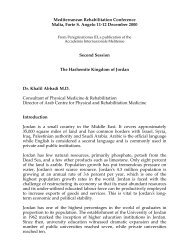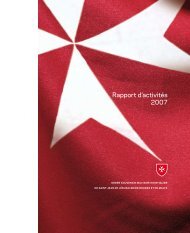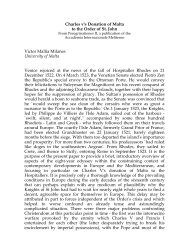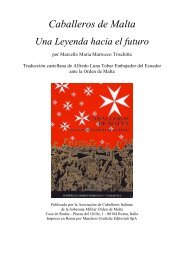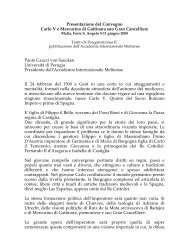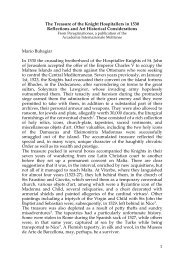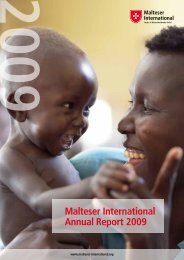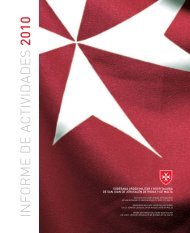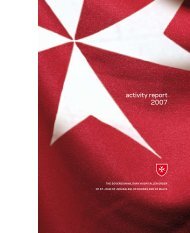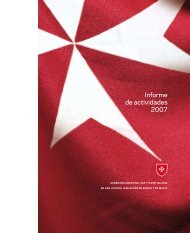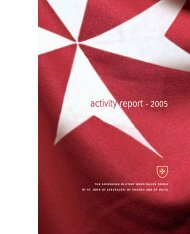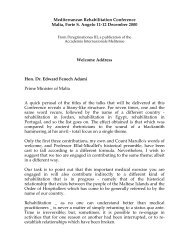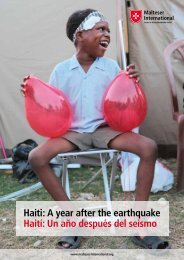Annual report 2005 Malteser International - Ordine di Malta
Annual report 2005 Malteser International - Ordine di Malta
Annual report 2005 Malteser International - Ordine di Malta
You also want an ePaper? Increase the reach of your titles
YUMPU automatically turns print PDFs into web optimized ePapers that Google loves.
Europe<br />
Balkans<br />
National staff: 28<br />
Aid for 2,000 people<br />
<strong>Malteser</strong> <strong>International</strong> has worked in<br />
the Balkans since 1995.<br />
The reorganisation after the<br />
collapse of the former Federal State<br />
of Yugoslavia has still not yet reached<br />
its final conclusion today. Separation<br />
between Serbia and Montenegro has<br />
been realised; the federal <strong>di</strong>versity<br />
of Bosnia and Herzegovina remains<br />
unproven in reality and the future<br />
status of Kosovo remains open.<br />
Irrespective of the political path taken<br />
and yet to be taken by the successor<br />
states, they all remain united in a deep<br />
social and economic crisis today, with<br />
the exception of Slovenia.<br />
<strong>Malteser</strong> <strong>International</strong> has been<br />
working in the Balkans for over ten years.<br />
Initially, work concentrated on emergency<br />
aid measures such as the <strong>di</strong>stribution of<br />
hygiene and food packages, but later the<br />
focus became rehabilitation and structural<br />
aid projects. The aim was and is to help<br />
people develop a new peaceful centre<br />
of life after years of bloody conflict and<br />
<strong>di</strong>splacement. Over the years, <strong>Malteser</strong><br />
<strong>International</strong> has developed two project<br />
forms still running today in the focus<br />
regions of Bosnia and Herzegovina and<br />
Kosovo.<br />
Women’s initiatives in Bosnia<br />
and Kosovo<br />
As many men <strong>di</strong>ed in the wars or were<br />
injured and returned home traumatised,<br />
the central organisational role in life<br />
after war fell to the women in many<br />
families. Working with local women’s<br />
groups, we developed programmes and<br />
measures intended to reinforce women’s<br />
skills, self-confidence and independence.<br />
Kosovo: The support of small-scale businesses – such<br />
as this coffee-roasting plant – improves the financial<br />
situation of many households.<br />
This includes careers training, the<br />
promotion of small trades, preventative<br />
health promotion, legal advice, the<br />
development and strengthening of<br />
local non-governmental organisations<br />
and reconciliation work. This concept<br />
developed in Bosnia was also adopted in<br />
Kosovo after 1999 and later even in Asian<br />
project areas.<br />
The foundation created in 2002 under<br />
the name ‘Bosnian-Herzegovina Women<br />
Initiative’ (BHWI) has been running all<br />
women’s projects for us since then as a<br />
local agency. For example, it counsels<br />
and supports unemployed women in the<br />
setting up of a business. The next step in<br />
independence was taken in <strong>2005</strong> when<br />
the BHWI requested subsi<strong>di</strong>es itself for<br />
the first time and received them.<br />
Income-generating measures<br />
Our income-generating measures are<br />
used to promote the integration of those<br />
returning home by helping them to found<br />
small businesses and service industries.<br />
Kosovo: Production sites for toilet paper: work and<br />
income for numerous families.<br />
Aid recipients pledge to donate part of<br />
the income they receive from their first<br />
year of operation to social and charitable<br />
projects, thus provi<strong>di</strong>ng simultaneous<br />
support for the development of civil<br />
society and democratic structures. In<br />
this way, we have promoted about 600<br />
in<strong>di</strong>vidual projects in Bosnia alone since<br />
2000, reaching more than 3,000 people in<br />
family and neighbourhood groups. Since<br />
2002, 650 people have found work in<br />
Kosovo in 230 businesses, thus creating<br />
a new existence for themselves and their<br />
families.<br />
Refugees and returnees<br />
On behalf of the United Nations High<br />
Commissioner for Refugees (UNHCR),<br />
<strong>Malteser</strong> <strong>International</strong> has accompanied<br />
135 refugee convoys over the past year,<br />
mainly carrying refugees home from<br />
Bosnia to Croatia, and also in the opposite<br />
<strong>di</strong>rection in some cases. We also provided<br />
those most in need when repatriated<br />
with an initial aid of up to EUR 100 per<br />
person.<br />
‘Rigid Shelter’ – a roof for the winter<br />
Some people in Kosovo are still<br />
without fixed accommodation that offers<br />
sufficient protection against the hard<br />
winter. On behalf of UNHCR, <strong>Malteser</strong><br />
<strong>International</strong> has installed winter-proof<br />
ready-built houses for returning refugee<br />
families. In this way, around 20 families<br />
were provided with a new, secure home<br />
in <strong>2005</strong>.<br />
Kosovo: Thanks to a small loan, this hairdresser has<br />
been able to re-open his salon.<br />
32 E U R O P E



